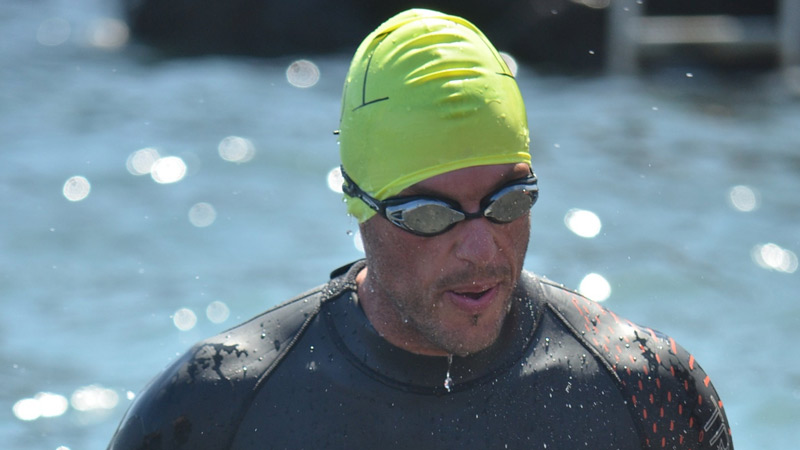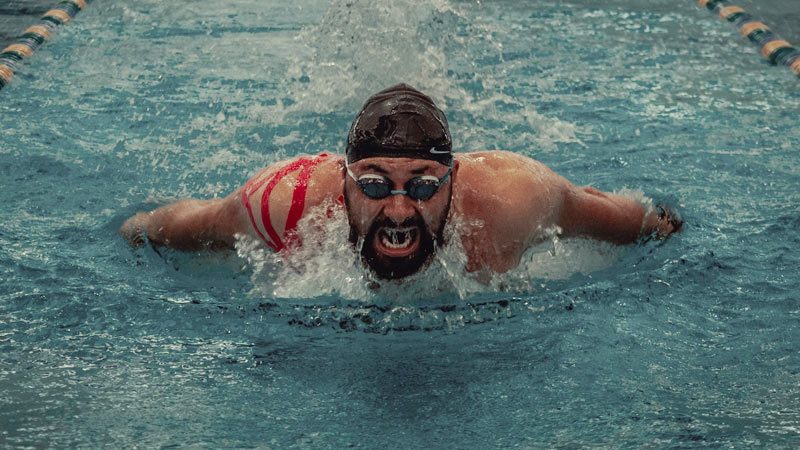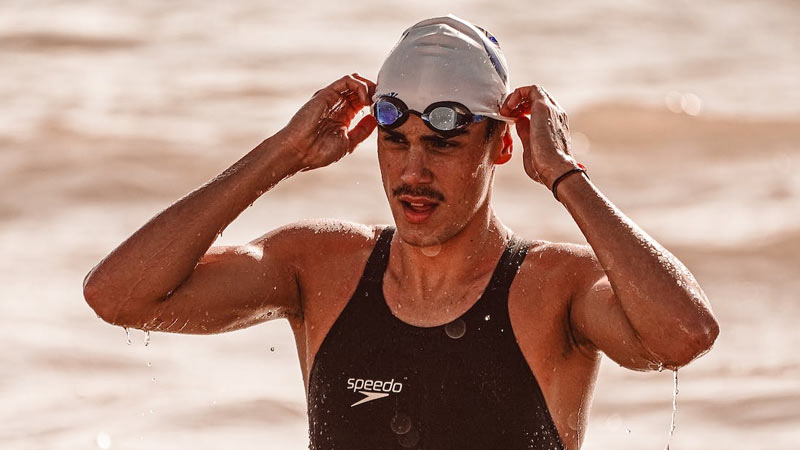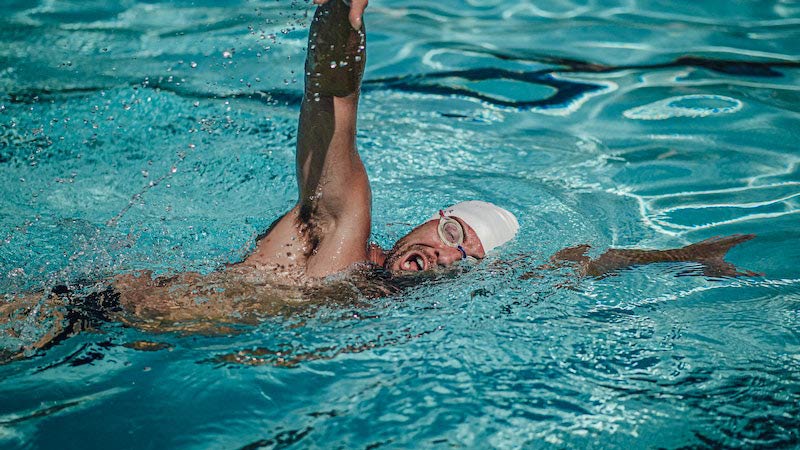Swimming is a favorite pastime for many, offering a refreshing escape from the scorching heat. However, for some, it’s followed by an unexpected and persistent bout of sneezing.
If you’ve ever found yourself repeatedly sneezing after a dip in the pool, you’re not alone. In this blog post, we will delve into the science behind this curious phenomenon.
We will explore the various factors that contribute to post-swim sneezing, such as chlorine exposure, temperature changes, and possible allergies.
Understanding the root causes of this reaction is crucial for those seeking relief and hoping to enjoy their swim without the post-pool sneezing fits.
So, whether you’re a dedicated swimmer or the occasional pool-goer, stay with us as we uncover the mysteries of why swimming often leads to sneezing. So, stay sharp.
Why Do I Sneeze So Much After Swimming?
Sneezing after swimming might be due to a condition called “swimmer’s rhinitis.”
It occurs when the nasal passages are irritated by various factors present in pool environments, such as chlorine, chemical byproducts, or even contaminants brought in by other swimmers.
When these substances come into contact with the sensitive lining of the nose, they can trigger sneezing as a response to remove or alleviate the irritation.
Additionally, sudden temperature changes from the water to the air might also contribute to this reaction.
To potentially reduce this, try wearing a nose clip while swimming to minimize contact between the irritants and your nasal passages.
Rinsing your nasal passages with a saline solution post-swim can also help alleviate irritation.
Science Behind Sneezing After Swimming
Sneezing after swimming stems from a combination of factors related to the unique environment of pools and the body’s response:
Chlorine Irritation
Chlorine, a common pool disinfectant, can irritate nasal passages. Chlorine breaks down into chemical byproducts that, when inhaled during swimming, can trigger sneezing by irritating the delicate nasal lining.
Contaminants Exposure
Pools can harbor various contaminants from swimmers, like sweat, urine, and personal care products.
When these mix with chlorine, they create volatile compounds that irritate the nasal passages, leading to sneezing.
Temperature and Humidity Changes
Moving from the warm, humid pool environment to cooler, drier air can cause rapid changes in nasal temperature and moisture levels, potentially triggering a sneezing response.
Mucous Membrane Sensitivity
Individuals with sensitive nasal linings might react more intensely to the irritants present in pool water, leading to increased sneezing episodes.
Chlorine Allergy Sneezing After Swimming In Pool

Sneezing after swimming in a pool could indicate a chlorine allergy, which, though rare, can cause specific reactions:
Allergic Rhinitis
Some individuals might develop allergic rhinitis due to chlorine exposure, leading to sneezing, congestion, and runny or itchy nose.
This reaction happens when the immune system mistakenly identifies chlorine as harmful and triggers an allergic response upon exposure.
Respiratory Irritation
Chlorine can irritate the respiratory system, particularly for those sensitive to it. Sneezing might occur as the body attempts to expel the irritant from the nasal passages.
Eczema and Skin Reactions
Chlorine allergies can manifest as skin issues, and sometimes, these skin reactions could indirectly contribute to sneezing.
Skin irritation might lead to an immune response that triggers nasal symptoms like sneezing.
Genetic Predisposition
Some people may have a genetic predisposition toward heightened sensitivity to certain chemicals, making them more susceptible to allergic reactions from chlorine exposure in pools.
Pre-existing Conditions
Those with asthma, chronic respiratory issues, or a history of allergic reactions might experience intensified sneezing after swimming due to their heightened susceptibility to environmental irritants like chlorine.
Histamine Release
Allergic reactions to chlorine can prompt the release of histamines in the body, leading to symptoms like sneezing, itching, and swelling in the nasal passages. Antihistamines might alleviate these reactions.
Temperature Changes and Nasal Response Regarding Chlorine Sneezing

The interplay between temperature changes and chlorine exposure can significantly influence nasal responses, potentially causing sneezing:
Temperature Shock
Moving from a warm pool environment to cooler external air can induce temperature shock in the nasal passages.
This sudden change can trigger the body’s defensive response, resulting in sneezing to regulate the temperature difference and expel potential irritants.
Mucous Membrane Sensitivity
Nasal mucous membranes might react more intensely to temperature variations when exposed to chlorine.
The combination of temperature change and chlorine’s irritant properties can exacerbate nasal sensitivity, leading to increased sneezing episodes.
Drying Effect
Rapid temperature shifts can dry out the nasal passages.
When chlorine, already known to be an irritant, interacts with dried nasal membranes, it can heighten irritation, prompting sneezing as a protective mechanism.
Reflex Response
Sudden temperature changes trigger the body’s reflex responses.
For some individuals, this change can cause the trigeminal nerve in the nasal cavity to react, potentially leading to sneezing as a protective mechanism to expel irritants.
Vasomotor Rhinitis
Drastic temperature changes can trigger vasomotor rhinitis, a condition where blood vessels in the nasal passages expand and contract excessively, causing sneezing, congestion, and nasal irritation.
Chlorine exposure in this context can exacerbate these symptoms.
How to Stop Sneezing After Swimming Pool?

To curb sneezing after a swim in a pool, consider these strategies:
Shower and Change Quickly
After swimming, take a shower to rinse off any chlorine or contaminants from your skin and hair. Change out of your swimwear promptly to avoid prolonged exposure to chlorine or irritants.
Consult an Allergist
If sneezing persists despite preventive measures, consider consulting an allergist. They can conduct tests to identify specific allergies and offer tailored recommendations or treatments.
Nasal Irrigation
Rinse your nasal passages with a saline solution post-swim to flush out irritants like chlorine or contaminants. This practice can soothe the nasal lining and reduce the chances of sneezing.
Nose Clips or Plugs
Wearing a nose clip while swimming can prevent water, along with potential irritants, from entering your nasal passages.
This minimizes exposure to chlorine and contaminants, potentially reducing post-swim sneezing.
Pre-Swim Nasal Protection
Apply a thin layer of petroleum jelly or a natural oil like coconut oil inside your nostrils before swimming.
This can act as a barrier, reducing direct contact between irritants and your nasal lining.
Use Antihistamines
If you suspect an allergic response to chlorine, over-the-counter antihistamines might help alleviate symptoms.
However, consult a healthcare professional before using any medication to address specific allergic reactions.
Tips to Prevent Sneezing A Lot after Swimming in A Pool
To minimize excessive sneezing following a swim in a pool, consider these preventive measures:
Shower Pre and Post-Swim
Take a quick shower before entering the pool to hydrate your skin and hair, creating a barrier that might reduce the absorption of pool chemicals.
After swimming, rinse off to eliminate any residual chlorine on your body that could irritate your nasal passages.
Rinse After Swimming
Shower immediately after leaving the pool to wash off any chlorine or pool chemicals from your skin and hair.
Consider using a saline nasal rinse to clear out any irritants from your nasal passages.
Hydrate Nasal Passages
Prior to swimming, consider using a saline nasal spray to keep your nasal passages moist.
This can create a protective barrier, reducing the chances of irritation from chlorine or contaminants in the pool water.
Consult a Doctor
If sneezing persists or is accompanied by other symptoms, consult an allergist or a healthcare professional.
They can determine if you have an allergy or sensitivity that requires specific treatment or management.
Limit Exposure Time
Shorten your time in the pool to decrease exposure to chlorine and potential irritants.
This might reduce the overall impact on your nasal passages, minimizing the likelihood of post-swim sneezing.
Seek Alternative Pool Options
Opt for pools with alternative disinfection methods like saltwater or UV systems, which might be less irritating to your nasal passages compared to traditional chlorine pools.
FAQs
Can sneezing after swimming be due to other factors besides chlorine?
Yes, sneezing after swimming can be triggered by factors beyond chlorine.
For instance, if the pool isn’t well-maintained and contains other irritants like dust, mold, or bacteria, these particles can also lead to nasal irritation and subsequent sneezing.
Additionally, individuals sensitive to cold water might experience a reflexive response, causing sneezing after swimming.
Why do I sneeze after swimming?
Sneezing after swimming might be due to irritants in the pool water, such as chlorine, which can cause the nasal passages to react.
When water, especially chlorinated water, enters the nasal cavity, it can trigger sneezing in some individuals sensitive to these chemicals.
Is sneezing after the pool normal?
For some individuals, sneezing after being in a pool is quite common, especially if the pool is heavily chlorinated.
The chlorine and other chemicals used to keep pools sanitized can irritate the nasal passages, leading to sneezing as a response.
What is the most effective chlorine allergy sneezing treatment?
Managing sneezing related to chlorine exposure involves various strategies. Rinsing your nasal passages with a saline solution after swimming can help flush out irritants.
Using over-the-counter antihistamines or decongestants might also alleviate symptoms. In severe cases, a doctor might recommend allergy medications or nasal corticosteroids to manage the reaction.
How can I prevent excessive sneezing after swimming?
To minimize sneezing after swimming, consider wearing a nose clip to prevent water from entering your nasal passages.
Taking a shower before and after swimming can help reduce the chemicals on your skin and in your hair.
Opt for pools with lower chlorine levels or explore saltwater pools, which might be less irritating to the nasal passages.
Wrapping Up
Post-swim sneezing can be a perplexing issue, but armed with knowledge, it’s possible to reduce or even eliminate this nuisance.
We’ve learned that factors like chlorine exposure, contaminants, temperature changes, and even allergies can contribute to sneezing after swimming.
To prevent this annoyance, consider adopting some of the suggested strategies, such as using nose clips, rinsing your nasal passages with saline solution, or even exploring alternative pool options.
By taking these precautions, you can enjoy your pool time without the constant interruption of sneezing fits.
Remember, the joy of swimming should not be marred by post-pool sneezing, and with these insights, you can make your aquatic adventures more enjoyable and sneeze-free. Dive in and make a splash with confidence! Best wishes.







